- Home
- Mack Reynolds
Once Departed
Once Departed Read online
Once Departed
Mack Reynolds
When the world’s ace secret agents crash a party in Spain, they’re onto something monstrous—an ominous threat to world peace.
It looked like a Convention of Secret Agents, thought the famous columnist Quentin Jones. Not one of them had been invited to the party of the distinguished Hungarian scientist. The Hungarian was known for advocating World Government—and for grafting a second head on a dog—but Quentin Jones suspected him of far more chilling experiments. Quentin runs up against former Nazi war criminals, and a series of weird murders that lead straight to… him.
Mack Reynolds
Once Departed
Chapter One
After the elevator had passed the eighth floor without either of its two passengers making any signs of debarking, Quint said, “Three’ll get you five we’re heading for the same party.”
The other said, in surprise, “You’re an American.”
“Sorry.”
“No, I meant… So am I, but you don’t look like an American.”
“What does an American look like?” Quint said. Actually, the man could have been his twin in many respects. They were both about five foot ten, one hundred and seventy, in their early thirties and dressed conservatively. They differed in that the other wore a crew cut and no beret, spoke in a voice a trifle louder and more hurried than did Quint. On top of that, he had the air of aggressiveness that types Americans to Europeans.
His fellow passenger laughed and held out a hand. “Bart Digby,” he said. “I hope you’re going to the Dempsey party.”
“Quint Jones,” Quint shook. “That’s right. But why hope?
The other looked uncomfortable. “Well, I was supposed to come with a friend. Englishman named Brett-Home…”
“I know Ronald, more or less. Met him at a few cocktail parties, and we work out at the same gym.”
“Well, he didn’t meet me when we agreed. But earlier he insisted that it was okay for me to crash the party.”
Quint said definitely, “Nobody has ever crashed a Dempsey party.” Then, when the other looked increasingly uncomfortable, “They’re all open-house affairs. Anybody, anybody at all, can wander in. They’re invariably informal affairs. Brawls.”
“Oh.” Bart Digby suddenly grinned a boyish grin that went with the crew cut. “I wanted to meet this Nicolas Ferencsik. Ronald said he’d be here.”
“Interested in surgical medicine, or looking for a pet?”
“A pet?” Digby said blankly.
They’d reached the penthouse and the elevator boy opened the door for them.
Quint Jones chuckled. “Didn’t you read about that latest experiment of Nicolas Ferencsik’s? He grafted a second head on a dog and it lived for over a month. Now, that’s something I could use around the apartment A two headed dog. Talk about a conversation piece.”
They were both laughing as they entered the penthouse foyer. There was no one there to greet them but party sounds erupted from several directions. The elevator door closed behind them.
“At any rate,” Bart Digby said, “if Ronald Brett-Home isn’t already here, I wonder if you’d, well, sort of introduce me to our hostess?”
Quint had to chuckle again. “You just won’t believe me, eh? By this time of the evening Marty Dempsey is probably so stoned she doesn’t know she’s the hostess and this is her own home.”
To make a liar of him, a fluttery woman in her early fifties and making no attempt to hide the years, zeroed in on them.
“Quentin,” she screamed. “Dahling !”
Quint winced. “My mistake,” he muttered. “Marty must be taking the cure again.” He turned on the faucet of his charm, kissed her on the cheek, then turned back to his new-found companion.
“Martha, may I present an old, old friend of mine, Bart Digby. Mrs. Dempsey, our hostess. You might say Bart and I came up together, Marty. Side by side we rose to the heights.”
Marty Dempsey simpered at the newcomer. “How thrilling. So both of you dahlings are writers.”
“Writers?” Digby said blankly. He looked at Quint in accusation. “Quint Jones,” he said. “She called you Quentin. Holy smokes, you’re Quentin Jones.”
Marty Dempsey looked from one of them to the other. Didn’t get it. Decided it was beyond her. Looked vague. Said, “I suppose you dahlings can find your own,” and wandered off.
Quint laughed in easy self-deprecation. “Don’t tell me I’ve got a fan.”
Digby said earnestly, “Listen, those three or four articles you did on segregation. You know what they did in my home state? They ended segregation there. It was laughed out of existence. Listen, those articles were damn good.”
Quint was embarrassed. “Well, thanks,” he said. He hated this sort of thing. One of the reasons he lived abroad was so that he could avoid gushing readers who seemed to be able to find considerably more message in his columns and articles than he usually intended to put into them.
He said, “Shall we join the party? From here on in, you’re on your own. Anybody might be here and you probably know as many of the guests as I do. The last party the Dempseys threw, the guest of honor was the head of the anarchist underground in Spain, sort of a left-over from Spanish Civil War days. While the police were searching for him on the streets—tracking down rumors he was in town—we were drinking champagne with him up here.” Quint added dryly, “He told us what he and his buddies figured on doing to us decadent capitalists after the anarchists took over.”
Bart Digby said, “Ronald told me they liked to base their get-togethers on controversial figures. Any rate, thanks again, uh, Quint. I guess the party’s center is over in there.”
’That’s pronounced bar,” Quint told him. “See you later.”
Quint cornered himself a Scotch at the commercial size bar which dominated the Dempsey living room, and began drifting around through the shrill, milling guests. He would have preferred Fundador brandy, but the Dempseys were of the breed who drank nothing of Spanish origin—at least not so long as they were in Spain. He had a sneaking suspicion that when they made trips to Scotland they ordered Fundador in bars and hotels, and that probably they drank French cognac in the States, and bourbon in France. He brought out a tiny notebook and scribbled a few lines in it. Might make a gag bit of business for the column.
He spotted his host, Ferd Dempsey, at the far side of the long room in heated discussion with two other obvious Americans and turned off in another direction. Ferd was in his arguing stage. Two drinks more and he’d start reciting quatrains from the Rubaiyat of Omar Khayyam. At that point, Quint usually made a practice of going home.
Somebody said, “Hi, Quint. Long time, no see.” The words were American but the accent was Spanish.
He turned and said, “Hello, Senor Garcia.”
“Joe to you,” the other told him. He was a man of middles. Middle age, middle height—given his lift heels—middle in weight. The man was a hanger-on of the foreign colony, and especially the Americans. Quint Jones didn’t particularly like him, for no particular reasons. Like the rest of the group, he used Jose Garcia Mendez when he needed some red tape cutting, or some information pertaining to life in Madrid. How to locate an apartment. Where to find a maid. How to keep your car in Spain after the six months legal deadline had elapsed. And, like the rest of the group, was hence obligated to tolerate the man.
A maid went by with a tray of entremeses and Quint snagged one. The Dempseys were doing themselves well tonight. They’d remembered to serve food. Often enough, Ferd and Marty, when on a binge, couldn’t stand the sight of refreshments other than alcoholic ones. But for that matter, the party seemed out of the usual, anyway. Quint Jones couldn’t put his finger on just why.
&nb
sp; He said, to make conversation, “Seems to be a lot of newcomers around tonight.”
Garcia nodded, sipped his champagne, wiped his mustache dry with a forefinger. “Should be some fun and games before the evening’s through, eh? You know who that sleazy looking character is over there?” He indicated direction with his head, but before Quint could answer said, “Vladimir Nuriyev. Nice guy, Vlad. Used to be a top hatchetman for the Chrezvychainaya Komissiya. Killed more innocent people than the plague. I doubt if it was a matter of his conscience ever hurting him. The story has it that the C.I.A. paid him a hundred grand to defect and spill his guts. So he’s spending it here in Spain. Where else?”
Jose Garcia loved American idiom. Unfortunately, Quint thought, he was always about twenty years behind on the latest slang terms.
Garcia was going on. “And that weepy looking type talking to Dave Shepherd? That’s Albrecht Stroehlein. Albrecht used to pick up the tab at the beerhalls in Munich, back when Hitler didn’t have a pot to…”
“Plant a flower in,” Quint finished for him. He looked over at the German his companion was talking about. A man of about sixty. From what Garcia said, probably one of the former Nazis who had fled to Spain to avoid Nuremberg.
Garcia said, as though with satisfaction, “You can imagine how our guest of honor is going to react to those two.”
Garcia was the town crier. The gossip who knew all, and if there wasn’t anything to know, invented something. Quint wasn’t usually interested in the ins and outs of his fellow expatriates in Madrid. He said, “Why shouldn’t Professor Ferencsik get along with them? What connection have they got with his field?”
The Spaniard grunted amusement, sipped his bubbly wine again, stroked his fingernail over his mustache again. “Pal, you just aren’t up on the news. Our Hungarian scientist’s second biggest interest in life is medicine.”
Quint was becoming irritated with the conversation, actually, but he said, “All right, all right, drop the other shoe.”
Garcia laughed, as though he had accomplished some minor triumph. “His first interest is the achieving of the One World. Of World Government. He’s a fruitcake on the subject. That’s why he left Hungary. Couldn’t stand the fact that they wouldn’t allow him to sound off about it.”
Quint said dryly, “And he came to Spain seeking freedom of speech?”
There was a subtle difference in Garcia’s tone. “But there are no restrictions on freedom of speech pertaining to foreigners in Spain. The anti-Franco bugaboo you read in the foreign press is largely commie inspired.”
Quint said, “Ummm. But for some reason my agent doesn’t seem to be able to place my column in any Spanish papers, although it’s in just about every other country in Western Europe.”
The party swirled up and around them, and when it receded Quint found the Spaniard had disappeared and that Marty Dempsey had taken his place. Marty had, by this time, acquired a drink, which made her look more natural. Neither of the Dempseys looked normal unless they were wearing a glass in the right hand.
She said, “How’s the party going, dahling? Have you seen that drunken husband of mine?”
“It’s going fine,” Quint told her automatically. “He was somewhere around a moment ago.” He looked around the room, and tried to peer out onto the dark terrace. “Don’t see him now.”
Marty was looking about unhappily, as well. “That Ronald. He was supposed to be here by now.”
“Ronald Brett-Home?” Quint said.
She giggled archly. “It was his idea to give this party, you know. You’d think he was nothing but a playboy, wouldn’t you?”
Quint shrugged. “Guess so.”
She tapped him on the arm, and her voice dropped into a conspiratorial whisper. “He’s actually connected with the British Embassy.”
“Oh? Empties the wastebaskets, or something?”
“Dahling, you have no idea. Actually, I mean actually, Ronald is a very sinister type. Cloak and dagger and all that. He was very famous back during the war. Parachutes behind the lines and all that.”
It seemed unlikely to Quint. He’d met the Englishman a few times. The other seemed to be a quiet character. Soft spoken. Sort of gentle. Quint said, “How do you mean, his idea? Is there supposed to be something special about this party tonight, pet?”
“Well, dahling,” Marty said, hooking a fresh drink from a passing tray and depositing her empty glass at the same time, “according to Ronald Brett-Home…”
Ronald Brett-Home was a bit late, he knew. He finished tying his black tie. Gave it a final adjustment. He grimaced into the mirror.
If the truth were known, he rather dreaded the evening. There would he some sort of a rowdydow, of course. He was glad that American chap, Bart Digby, would be there. Efficient, these American operatives. Must really give the chaps credit. What was the name of that one during the war? Brunner, or something. Gestapo finished him there on the outskirts of Prague. Held them off, singlehanded. Sort of rearguard action, whilst Brett-Home escaped with the equipment. Damn good man.
He opened the bureau drawer and scowled down at the black Baretti. He supposed he’d better take it, in spite of the fact that it would bulge his pocket. Accurate guns those Italian fellows made. A bit light as to caliber, but frightfully accurate. He took the automatic up and slipped it into his trousers pocket.
He gave himself a final check in the mirror. He’d really have to get going. He’d already missed his date with Digby and would have to meet him at the party. Quit dreading this and get a move on, you know. If the truth were known, he was getting too old for this sort of thing. Should leave it to younger chaps. Twenty or twenty-five years ago, yes. He had been frightfully keen about doing in the enemy counter-espionage fellows, and that sort of thing. But, really now, a chap in his mid-forties should let them assign him to a desk. MI6 was all very fine, but the field work…
The bell rang. Ronald Brett-Home frowned and went to the door. He couldn’t imagine who…
He opened up and for the moment didn’t recognize the large, one might almost say hulking, figure standing there. But then he did. Impossibly, unbelievably, did.
But it was twenty, almost twenty-five… No, it was impossible. Absolutely impossible. He tried to say something. Took a step backward. The other followed him and large, blunt fingered hands began to come up.
Ronald Brett-Home’s mouth twitched silently. His face worked. He had never felt fear before in his life. Not real fear. Not this fear.
But it was almost twenty-five years, and the other had not been young, even then.
He stepped back again, almost tripped on the rug. All of a sudden his hand, shaking, fumbled for his trouser pocket. The Baretti came out, flaming, the first shot blasting into the rug, but the second and third, so close together as almost to be a single roaring, thudded into the bulk of the oncoming…
… the oncoming horror that was upon him, rending and tearing, muttering gutturally in its throat.
“… according to Ronald Brett-Home,” Martha Dempsey was saying, “all sorts of sparks will fly when Professor Ferencsik meets with some of the other guests. Ah, there the wretch is!”
The wretch was evidently her husband, Ferd, whose voice boomed out from the darkness of the terrace.
“And much as Wine has play’d the Infidel, “And robb’d me of my Robe of Honor—Well, “I wonder often what the Vintners buy “One half so precious as the stuff they sell.”
Quint’s hostess was off and he grunted amusement and looked about the room for further entertainment.
Someone said, “Avoiding me, Quentin?”
“Good grief, no. Didn’t expect you to be here. Doesn’t school start in a few days?”
It was Marylyn Worth, looking impossibly blue of eye, improbably blond of hair, and fantastically the nice American-girl type. She had an honest freshness about her that you didn’t find in the Madrid expatriate circle.
He knew that she knew he liked the light touch. And he also knew th
at she attempted to achieve it, for his sake, although her own nature was to be on the overly earnest side.
She said brightly, making an amusing gesture with her champagne cocktail, “That’s exactly why I’m here. To get a bit of C2H5OH into my blood stream before I have to take over drilling knowledge and ethics into the little monsters.”
“What’s C2H5OH?” he asked her.
“Alcohol,” she told him. “Hmmm, the great columnist doesn’t seem to be up on his chemistry.”
Over her head he could see a small group beginning to gather about Nicolas Ferencsik who was talking to the ex-Russian hatchetman, Nuriyev, and evidently becoming animated about something.
“Talking about monsters,” Quint said, “we ought to get in on that argument over there. Everybody’s been telling me that fur is supposed to fly when our guest of honor meets some of the others here tonight.”
“Oh?” she frowned. “What has Professor Ferencsik got to do with monsters? I thought he won Nobel prizes and things like that.”
Quint chuckled. “Yes, but by performing such feats as transplanting the brain of a chimp into the skull of an orangutan.”
“But you can’t do that. They’re different species.”
Quint laughed. “Argue that with him. You’re the science teacher.”
Marylyn’s frown deepened. “You go ahead. I hate arguments. Perhaps I’ll avoid meeting the Professor. Besides, I wanted to see Marty Dempsey about something.”
“Okay, see you later, pet.” Quint took up a fresh drink from the bar and strolled toward the growing group centered about the Hungarian medical genius. He decided he would see more of Marylyn before the evening was over. The girl was beginning to grow on him, in spite of the fact that he preferred being the aggressor in the boy-meet-girl game.
Nicolas Ferencsik, up closer, turned out to be a smallish feisty man, in the vicinity of fifty-five though his energy belied his years. By the time Quint arrived, he’d already got to the point where his eyes were flashing the passion of his belief. His English was excellent.

 Happy Ending
Happy Ending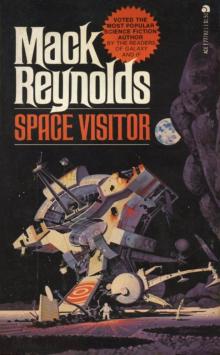 Space Visitor
Space Visitor A Kiss Before Loving
A Kiss Before Loving Episode on the Riviera
Episode on the Riviera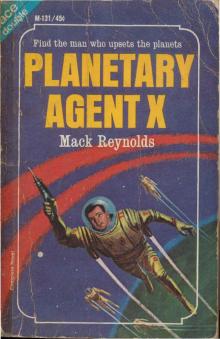 Planetary Agent X
Planetary Agent X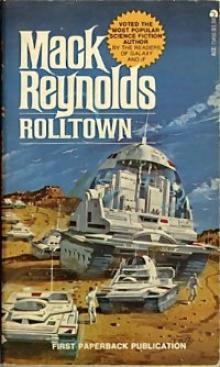 Rolltown bh-3
Rolltown bh-3 The Second Mack Reynolds Megapack
The Second Mack Reynolds Megapack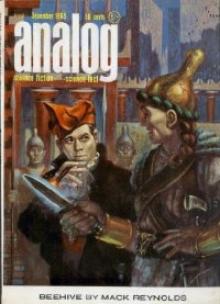 Dawnman Planet up-2
Dawnman Planet up-2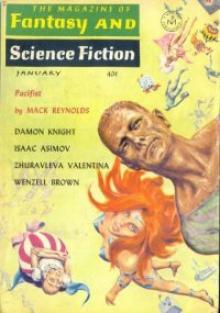 Pacifist
Pacifist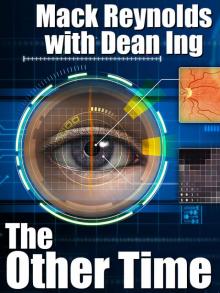 The Other Time
The Other Time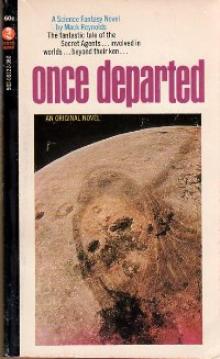 Once Departed
Once Departed IQ
IQ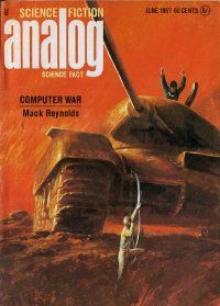 Computer War
Computer War Earth Unaware
Earth Unaware The Rival Rigelians up-3
The Rival Rigelians up-3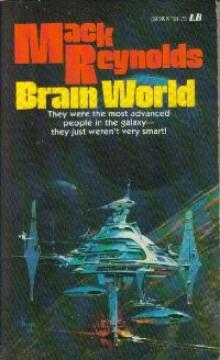 Brain World up-7
Brain World up-7 Star Trek - TOS - Mission to Horatius
Star Trek - TOS - Mission to Horatius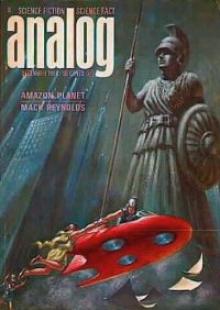 Amazon Planet up-5
Amazon Planet up-5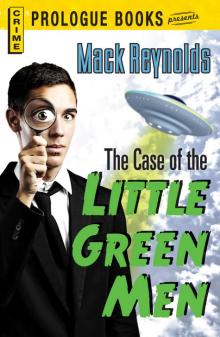 The Case of the Little Green Men
The Case of the Little Green Men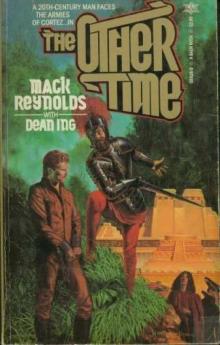 Other Time
Other Time The Mack Reynolds Megapack
The Mack Reynolds Megapack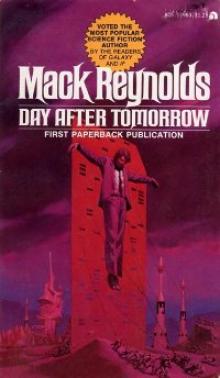 Day After Tomorrow
Day After Tomorrow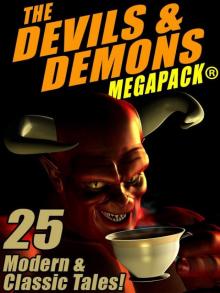 The Devils & Demons MEGAPACK ®: 25 Modern and Classic Tales
The Devils & Demons MEGAPACK ®: 25 Modern and Classic Tales Mission to Horatius
Mission to Horatius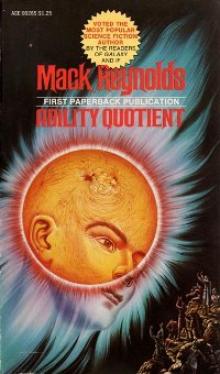 Ability Quotient
Ability Quotient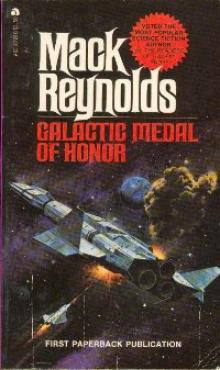 Galactic Medal of Honor
Galactic Medal of Honor Trojan Orbit
Trojan Orbit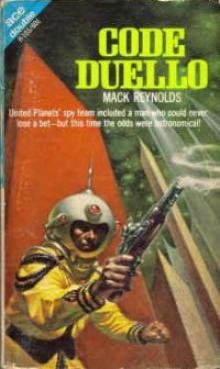 Code Duello up-4
Code Duello up-4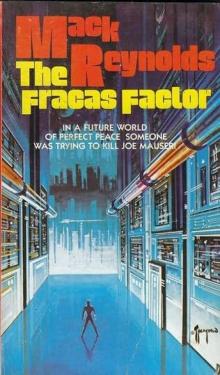 The Fracas Factor
The Fracas Factor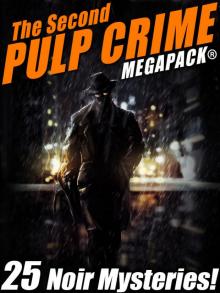 The Second Pulp Crime
The Second Pulp Crime Deathwish World
Deathwish World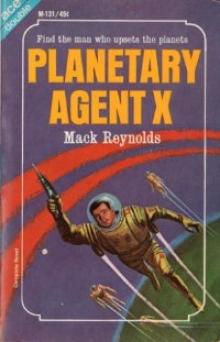 Planetary Agent X up-1
Planetary Agent X up-1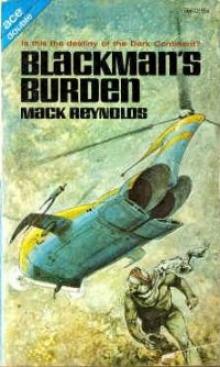 Blackman' Burden na-1
Blackman' Burden na-1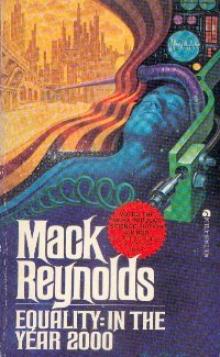 Equality: In the Year 2000 jw-2
Equality: In the Year 2000 jw-2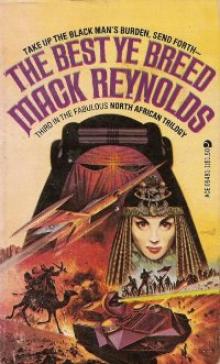 The Best Ye Breed na-3
The Best Ye Breed na-3 The Jet Set
The Jet Set The Rival Rigelians
The Rival Rigelians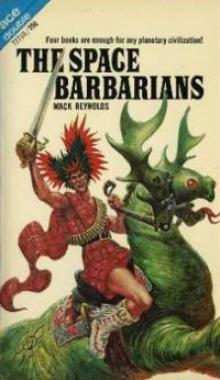 The Space Barbarians
The Space Barbarians